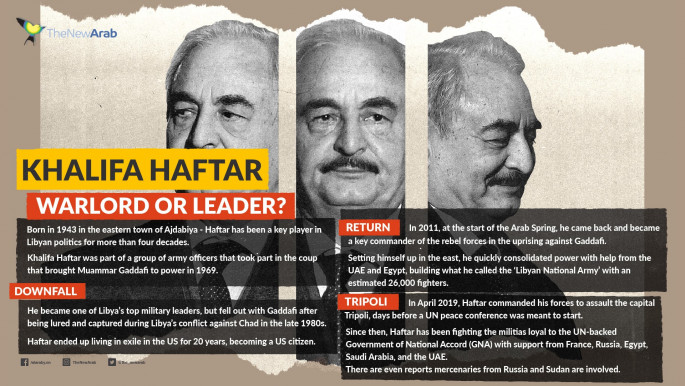'Nightmare' for Algeria and Tunisia if Haftar captures Libya capital, say analysts
Talks between representatives of Libya's warring parties in Geneva last week ended on Saturday with no deal of a ceasefire.
Earlier this month, world leaders leaders met in Berlin in an attempt to broker a peace deal, after a shaky truce and verbal promises to end the conflict.
Last month, Tin Hinane El-Kadi, Algeria expert at Chatham House, emphasised how cautious Algeria was to intervene militarily in its neighbour’s conflict.
She did not rule out some form of military action in the event that Haftar forces enter Algerian territory.
"Because of its history, Algeria is very cautious to intervene in other countries. We suffered so much from colonialism and international foreign interference I think this is kind of a solid principle," Tin said.
"I don't think you will see Algerian troops going into Libya," she said. "It's not part of the mentality of the army."
However, she said that if at any point the sprawling Algerian border with Libya including the permeable Sahara is threatened "Algeria would defend its border".
Read More: How Libya's crisis forced Algeria to come out of diplomatic hibernation
Some security analysts say that though the likelihood of Haftar taking and keeping Tripoli remain low, if something like that were to happen it would be a "nightmare" for both its neighbours, Tunisia and Algeria.
Tunisia has the added disadvantage of close trade ties and the greater presence of Tunisians and Libyans in each other’s countries.
Karim Mezran, a senior fellow at the Rafik Hariri Centre told Al Jazeera, that there is the potential for the war worsening.
"[Haftar] can destroy the city. He can inflict a lot of harm and pain but I don't think he has the strength to hold the city," he said.
"If Haftar pushes through and enters Tripoli, it will force many civilians to flee to Tunisia and cause major instability along the border. It will be a nightmare."
 |
Haftar is moving
Recently, Haftar's forces launched in April an assault in April on the UN-recognised Government of National Accord (GNA) troops in Tripoli. Haftar's forces are mostly based in the east of the country.
The conflict has drawn a range of international players into the fray, including Turkey, which has backed the Tripoli-based GNA, while Haftar has support from Russia, the UAE and Egypt.
Last month, Turkish President Recep Tayyip Erdogan said the Libyan crisis could not be solved by "military means" after talks with his Algerian counterpart in Algiers.
Algeria, which shares a 1,000-kilometre (620-mile) border with Libya, is trying to mediate a political settlement to the conflict gripping its neighbour that threatens regional stability.
"We have said from the beginning that the Libyan crisis would not be resolved through military means," Erdogan told reporters after meeting Algerian President Abdelmadjid Tebboune.
"We are in intense negotiations with the countries of the region and with international actors to secure the ceasefire and facilitate the return to political dialogue in Libya," Erdogan told reporters.





 Follow the Middle East's top stories in English at The New Arab on Google News
Follow the Middle East's top stories in English at The New Arab on Google News
![Israeli forces ordered bombed Gaza's Jabalia, ordering residents to leave [Getty]](/sites/default/files/styles/image_330x185/public/2176418030.jpeg?h=a5f2f23a&itok=_YGZaP1z)

